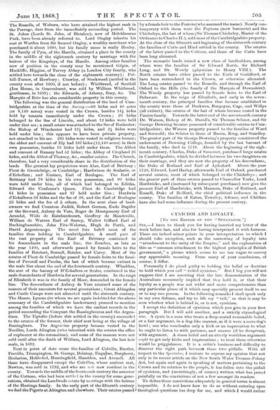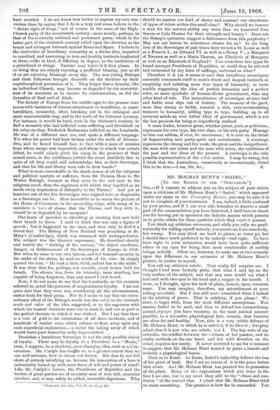CYNICISM AND LOYALTY.
(TO THE EDITOR OF TIIE "SPECTATOR."] SIR,—I have to thank you for having inserted my letter of the week before last, and also for having interpreted it with fairness. There are indeed minor points in your interpretation to which I should take exception, such as the narrowing of loyalty into "attachment to the unity of the Empire," and the explanation of this as "common attachment to the highest principles of British government," a phrase which seems to me too vague to convey any appreciable meaning. From many of your conclusions, of course, I differ.
Personally I do plead guilty to holding the belief or doctrine
to hold which you call "veiled cynicism." But I beg you will not suppose that I am asserting that the late demonstration of the Australians necessarily implied that they bold it, or that their loyalty as a people was not wider and more comprehensive than any particular phase of it which may specially present itself to me or to any one person. In the following remarks' shall speak only in my own defence, and try to lift my "veil," so that it may be seen whether what is behind is, or is not, cynicism.
I accept the definition of cynicism which you give in your first
paragraph. But I will add another, and a strictly etymological one. A cynic is a man who treats a deep-seated reasonable belief, or a fair argument, in a dog-like manner, as if it were a mere dog's howl ; one who vouchsafes only a kick or an imprecation to what he ought to listen to with patience, and answer (if he disagrees), with argument. A sham belief and an utterly worthless argument ought to get only kicks and imprecations ; to treat them otherwise would be priggishness. It is a critic's business and difficulty to discover the right path between these two pitfalls. With all respect to the Spectator, I venture to express my opinion that not only in its recent article on the New South Wales Treason-Felony Act, but again and again in speaking of matters pertaining to the Crown and its relation to the people, it has fallen into the pitfall of cynicism, and (unwittingly, of course) written what has jarred painfully on the convictions of not a few amongst its readers.
To define these convictions adequately in general terms is almost impossible. I do not know how to do so without entering upon theological questions too deep for me, and which I would rather
have avoided. I do not know how better to express my own con- viction than by saying that I do in a very real sense believe in the "divine right of kings ;" not of course in the sense of the High- Church party of the seventeenth century ; more nearly, perhaps, in that of the eminently national and protestant party, which in the latter part of the sixteenth century relied upon the doctrine as the truest and strongest bulwark against Rome and Spain. I believe in the institution of hereditary monarchy as a divine idea, imparted to mankind, and answering to true and healthy instincts implanted in them,—like in kind, if differing in degree, to the institution of a priesthood or clergy. Nations may reject it if they please. In so doing they are simply rejecting a proffered blessing, just as all of us are rejecting blessings every day. The non-juring Bishops and their followers brought discredit on the doctrine by their unphilosophical perversion of it. They forgot that a dynasty, like an individual Church, may become so degraded by the unworthi- ness of its members as to receive its condemnation, as did the dynasties of Saul and of Ahab.
The history of Europe from the middle ages to the present time teems with instances of intense attachment to hereditary, or quasi- hereditary, monarchy, often breaking out in the strangest and most unaccountable way, and in the teeth of the bitterest tyranny. For instance, it would be hard, even in the thirteenth century, to find a monarch who had inflicted more suffering and bloodshed on his subjects than Frederick Barbarossa inflicted on the Lombards. He was of a different race, too, and spoke a different language. Yet when his power had been broken under the walls of Alessan- dria, and he found himself face to face with a mass of enemies from whom escape was impossible, and whom to attack was certain defeat, he could calmly pitch his camp in the presence of their armed hosts, in the confidence (which the event justified) that in spite of all they would still acknowledge him as their Sovereign, and that his life and liberty were safe in their hands.*
What is more remarkable in the death scenes of all the religious and political martyrs or sufferers, from Sir Thomas More to Sir Walter Raleigh, staunch as they were to the end each to his religious creed, than the eagerness with which they repelled as an insult every imputation of disloyalty to the Throne? And yet at least two out of the five Sovereigns who reigned were as despicable as a Sovereign can be. How incredible to us seems the picture of the House of Commons, in the succeeding reign, with many of its members in tears of shame that the Throne, and they with it, should be so degraded by its occupant !
One hears of speeches so absorbing or exciting that men hold their breath to listen. I used to think this was only a figure of speech ; but it happened to me once, and once only, to find it a literal fact. The Bishop of New Zealand was preaching at St. Mary's (Cambridge), which was crammed with undergraduates. The subject was the Queen's supremacy. He described shortly and tersely the "shaking of the nations," the abject condition, danger, or dethronement of the Sovereigns of Europe in 1818. But when he came to our own Queen, and her tranquil security in the midst of the storm, he used no words of his own ; he simply quoted the text, "He took a little child, and set her in the midst." It was then that for, perhaps, ten seconds, every hearer held his breath. The silence was, from its intensity, more startling, less capable of being forgotten, than any sound I ever heard.
Now, I do not mean to say that the Lombards, on the occasion referred to, acted like patterns of magnanimous loyalty. I am not quite sure that they were not, considering all the circumstances, rather fools for their pains. Nor do I mean to say that the extra- ordinary effect of the Bishop's words was due solely to the intrinsic truth and value of the idea suggested, or to the eagerness with which his hearers' instincts went out to meet it, and not in part to the perfect rhetoric in which it was clothed. But I say that there is a vein of gold in the substratum of all these incidents, and of hundreds of similar ones, which refuses to float away upon any such superficial explanation,—a metal the taking away of which would leave poor humanity sadly impoverished.
Doubtless a hereditary Sovereign is not the only possible object of loyalty. There may be loyalty to a President, to a "House," even, I suppose, to a shadowy, ever-changing idea, such as a Con- stitution. Mr. Carlyle has taught us, to a greater extent than we can well estimate, how to choose our heroes. But does he not fall short of entirely satisfying us, because his conception of a hero is indissolubly bound up with mere force of will and power of mind? Like Mr. Carlyle's heroes, the Presidents of Republics and the leaders of great parties are of necessity men of iron will, muscular intellect, and, it may safely be added, invincible digestions. Why SismonW, Rat. Rep., Vol. II., eh. xi., p. 212. should we narrow our field of choice and contract our storehouse of types of rulers within this small class ? Why should we honour a man for his natural ability any more than we honoured Tom Sayers or Lola Montez for their strength and beauty? Does not the Bishop's quotation suggest a deliverance from this perplexity? May not our heroes be sometimes chosen for us ? In the long lists of the Sovereigns of past times have we not a St. Louis as well as a Francis I., an Edward VI. as well as a Henry V., a Margaret of Navarre as well as a Maria Theresa, an Elizabeth of Hungary as well as an Elizabeth of England ? Can even these few types be found amongst Presidents of Republics, or could they be selected and enthroned by any form of suffrage, universal or other ?
Therefore it is (as it seems to me) that hereditary sovereignty naturally commends itself to men's truest and deepest instincts as supplying and enlisting more true types of humanity, as more readily suggesting the idea of perfect humanity and a perfect ruler, as more symbolic of human-divine government, than any other kind of rule. The remembrance of sovereigns at once bad and feeble soon slips out of history. The memory of the good, were they strong or feeble, remains a rich, ever-accumulating treasure to humanity, adding type to type, building up in all reverent minds an ever loftier ideal of government, which is not the less precious for being so imperfectly realized.
A mere leader, however great, whether priest, poet, or politician, represents his own type, his own class, or his own party. Homage to him can seldom, if ever, be unanimous ; it is ever on the brink of degenerating into party-spirit and sectarianism. A sovereign represents the strong and the weak, the great and the insignificant, the man with one talent and the man with seven, the traditions of the past and the ideas of the present. A sovereign is the only possible representative of the whole nation. I may be wrong, but I think that the Australians, consciously or unconsciously, found
this to be true.—I am, Sir, &c., Z.































 Previous page
Previous page